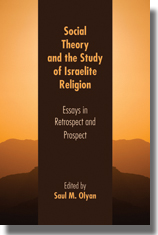
$32.00
This volume assesses past, theoretically engaged work on Israelite religion and presents new approaches to particular problems and larger interpretive and methodological questions. It gathers previously unpublished research by senior scholars well known in social theory and Israelite religion and by junior scholars whose writing is just beginning to have a serious impact. The volume begins with a critical introduction by the editor. Essay themes include gender, violence, social change, the festivals, the dynamics of shame and honor, and the relationship of text to ritual. The contributors engage theory from social and cultural anthropology, sociology, postcolonial studies, and ritual studies. Theoretical models are evaluated in light of the primary data, and some authors modify or adapt theory to increase its utility for biblical studies.
Saul M. Olyan is Samuel Ungerleider Jr. Professor of Judaic Studies and Professor of Religious Studies at Brown University. He is the author most recently of Social Inequality in the World of the Text: The Significance of Ritual and Social Distinctions in the Hebrew Bible (Vandenhoeck & Ruprecht), Disability in the Hebrew Bible: Interpreting Mental and Physical Differences (Cambridge University Press), and Biblical Mourning: Ritual and Social Dimensions (Oxford University Press).
Click here for a printable publication sheet that you can put in your files or give to your librarian or bookstore.
Click here for the title page, table of contents, and introduction.
“Inspired by theoretical work in the social sciences, each contributor to this important collection grapples with formative biblical material in a creative and thought-provoking way. The authors, who represent a refreshing range of scholarly generations, make classic methodological approaches their own, drawing deftly upon the work of Weber, Douglas, Turner, Mauss and others to explore manifestations of Israelite patterns of culture. In the process, they offer thoughtful and nuanced assessments of the applicability of these theoretical approaches to the ancient evidence, pointing both to their relevance and to their limitations. The essays deal with critical threads in cultural studies including gender and embodiment, sacred violence and scape-goating. The book will serve as a valuable asset in a range of courses that explore intersections between the humanities and the social sciences.”
—Susan Niditch, Samuel Green Professor of Religion, Amherst College
“This collection of essays offers a fresh, constructive engagement between social science theory and ancient Israelite religion. At the heart of the issues addressed in this volume is social conflict and negotiation, whether in the realm of the priesthood, prophecy, ritual, cult, or magic. The authors, all first-rate scholars, explore the application of social science research to a wide variety of issues in Israelite religion: different aspects of religious struggle; the impact of diaspora on traditional forms of identity and authority; the social function of communal meals; the significance of textual destruction; and the social purposes of violence and witchcraft accusations. Most usefully, the essays pose fundamental questions about the use of social science theory for biblical research. They also offer constructive criticisms and suggestions about what has been lacking in social science theorizing for the subjects that they undertake. The result is a very thoughtful work, one that builds a firmer foundation for future research for Israelite religion. With this achievement, Saul Olyan has once again done the field of biblical studies a great service. Every serious student of Israelite religion should have this book.”
—Mark S. Smith, Skirball Professor of Bible and Ancient Near Eastern Studies, New York University
